In the realm of digital marketing and automation, having the right tools at your disposal can make all the difference in streamlining workflows and driving results. Two popular contenders in this space are Ruby and Posh, each offering unique features and capabilities to help businesses thrive. In this blog post, we’ll delve into a detailed comparison of Ruby and Posh, along with a similar tool, to help you make an informed decision for your business needs.
Overview
Ruby specializes in providing virtual receptionist services specifically tailored for small and medium-sized businesses. Their suite of offerings includes live call answering, proficient message management, and efficient appointment scheduling. What truly distinguishes Ruby is their unwavering commitment to delivering friendly and professional receptionists, meticulously trained to provide exceptional customer service. Whether it’s handling incoming calls with a warm demeanor or managing appointments with precision, Ruby ensures that every interaction leaves a positive impression on clients and customers alike.
On the other hand, Posh caters to businesses of all sizes, offering a comprehensive range of virtual receptionist and customer support solutions. Their services encompass various aspects, from live call answering to lead qualification and seamless CRM integration. Posh’s approach is centered around enhancing customer interactions, ensuring that businesses can effectively engage with their clientele. Notable features of Posh include customizable workflows and advanced analytics capabilities, empowering businesses to optimize their customer engagement strategies. With Posh, businesses can tailor their receptionist and customer support solutions to align with their unique requirements, thereby fostering enhanced customer satisfaction and loyalty.
1. Comparison of Features
Ruby stands out for its user-friendly interface and seamless integration with existing systems. This ensures that users have a hassle-free experience, allowing them to navigate the platform effortlessly. One of the key advantages of Ruby is its round-the-clock availability, ensuring that businesses never miss a call or inquiry. Their team of receptionists is trained to handle every interaction promptly and professionally, enhancing the overall customer experience. Additionally, Ruby offers personalized greetings and call screening options, allowing businesses to tailor their communication to the specific needs of their customers. These features elevate the caller experience, fostering a positive impression of the business and promoting customer loyalty.
Posh distinguishes itself with cutting-edge features such as AI-powered chatbots and sentiment analysis. These advanced capabilities enable businesses to take customer interaction to new heights by leveraging automation and data analytics. The AI-powered chatbots can handle routine inquiries and tasks, freeing up human resources for more complex interactions. Furthermore, Posh offers customizable scripts and workflows, allowing businesses to tailor the service to align with their unique requirements and preferences. This level of customization optimizes efficiency and enhances customer satisfaction, as businesses can design workflows that reflect their brand identity and communication style. Overall, Posh’s features and functionality empower businesses to deliver exceptional customer service and drive meaningful engagement with their audience.
2. Automation Capabilities:
1. Ruby:
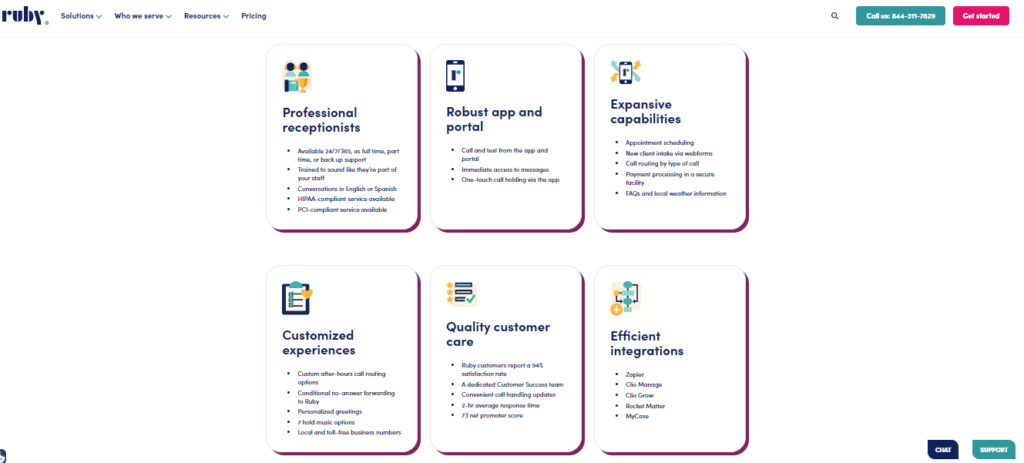
Ruby excels in providing a comprehensive suite of automation features designed to streamline marketing processes and enhance efficiency. Some of the key automation capabilities offered by Ruby include:
– Email Marketing: Ruby’s email marketing automation allows businesses to create and send personalized email campaigns to their target audience. With features such as drip campaigns, segmentation, and A/B testing, businesses can effectively nurture leads and drive conversions.
– Social Media Scheduling: Ruby’s social media scheduling tools enable businesses to plan and schedule posts across various social media platforms, including Facebook, Twitter, and Instagram. By automating the posting process, businesses can maintain a consistent online presence and engage with their audience more effectively.
– Lead Scoring: Ruby’s lead scoring functionality helps businesses identify and prioritize high-quality leads based on predefined criteria. By assigning scores to leads based on factors such as engagement level, demographics, and behavior, businesses can focus their efforts on prospects with the highest potential for conversion.
2. Posh:
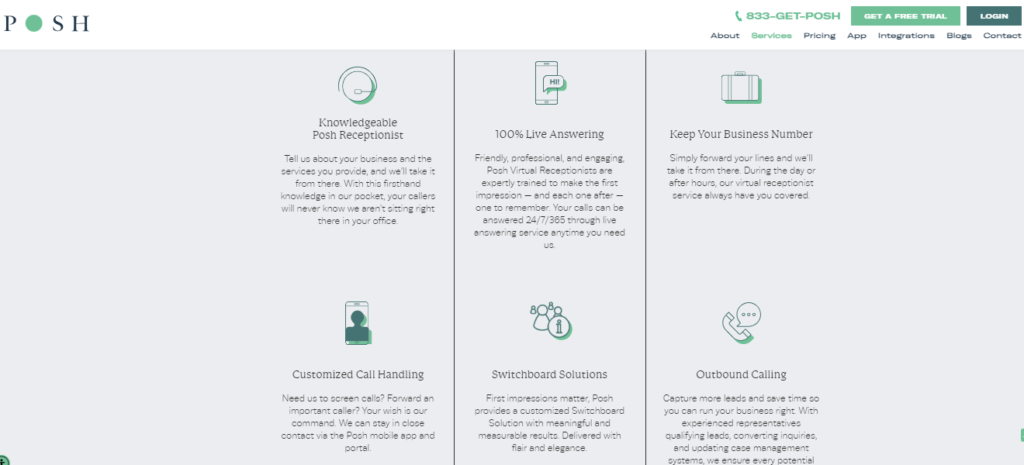
Posh offers advanced automation capabilities aimed at delivering targeted messages and personalized experiences to customers. Some of the key automation features provided by Posh include:
– Behavioral Triggers: Posh’s behavioral triggers allow businesses to automate responses and actions based on user behavior and interactions. For example, businesses can set up triggers to send follow-up emails or offers to customers who have abandoned their carts or visited specific pages on their website.
– Dynamic Content Personalization: Posh’s dynamic content personalization tools enable businesses to deliver highly relevant and personalized content to their audience. By leveraging data such as purchase history, browsing behavior, and demographics, businesses can tailor their marketing messages and recommendations to each individual customer.
– Automated Workflows: Posh offers customizable workflows that automate repetitive tasks and processes, saving businesses time and resources. From email campaigns to customer service interactions, businesses can automate various aspects of their operations to improve efficiency and scalability.
3. Integration Options:
Ruby:
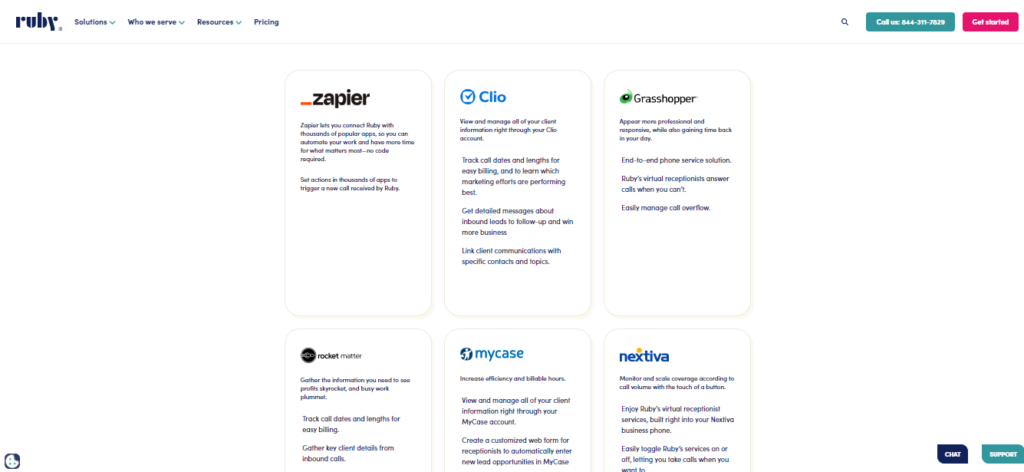
Ruby offers seamless integration with a wide range of popular CRM platforms, e-commerce systems, and third-party applications. This ensures that businesses can easily sync their customer data and automate workflows across different platforms. Whether you’re using Salesforce, HubSpot, Shopify, or any other CRM or e-commerce platform, Ruby’s integration capabilities make it easy to centralize your customer interactions and streamline your operations.
For example, suppose you’re using Salesforce as your CRM platform. In that case, Ruby can sync customer call data directly into your Salesforce account, allowing you to track interactions and follow up with leads more effectively. Similarly, suppose you’re running an e-commerce store on Shopify. In that case, Ruby can integrate with Shopify to automatically update customer records and order information based on phone calls received through the Ruby platform.
With Ruby’s seamless integration options, businesses can ensure that their customer data is always up-to-date and easily accessible across all their systems, leading to improved efficiency and better customer service.
Posh
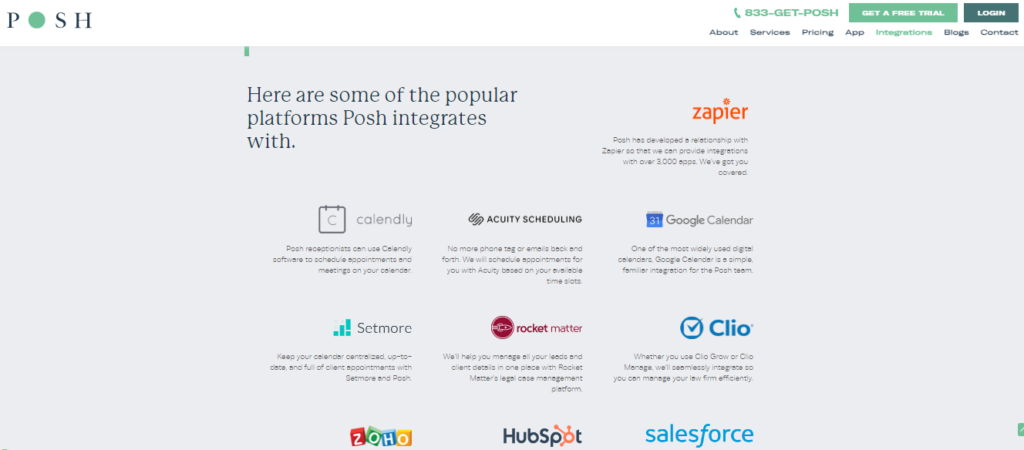
Posh offers robust integration options with various marketing tools and platforms, allowing businesses to leverage their existing systems and maximize efficiency. Whether you’re using email marketing software, social media management tools, or CRM platforms, Posh’s integration capabilities make it easy to streamline your marketing efforts and track customer interactions across different channels.
For example, if you’re using Mailchimp for email marketing, Posh can integrate with Mailchimp to automatically sync customer contact information and campaign data, enabling you to create targeted email campaigns based on customer interactions. Similarly, if you’re using Hootsuite for social media management, Posh can integrate with Hootsuite to track social media interactions and engage with customers in real-time.
By integrating Posh with your existing marketing tools and platforms, you can centralize your customer data, track interactions more effectively, and create personalized marketing campaigns that drive results. With Posh’s robust integration options, businesses can enhance their marketing efforts and improve their overall customer experience.
4. Pricing:
Ruby:
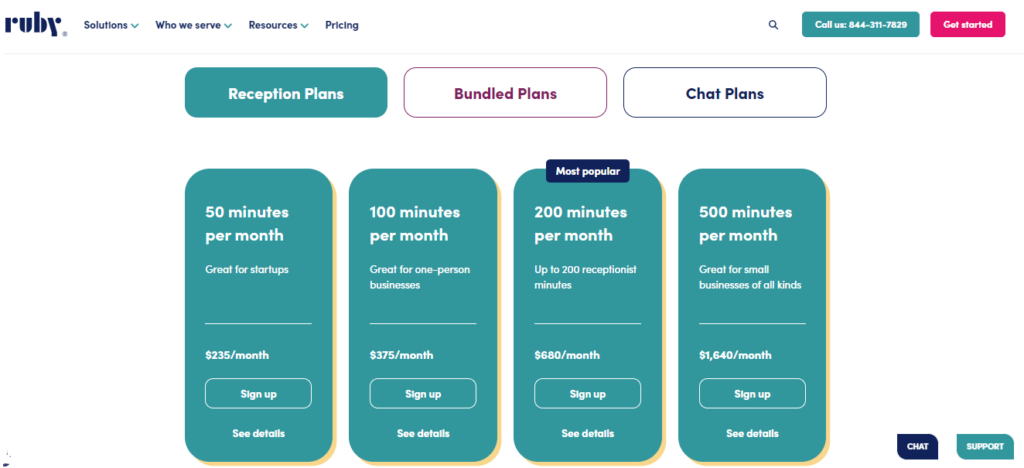
Ruby offers flexible pricing plans tailored to the needs of businesses of all sizes. They provide options for both monthly and annual subscriptions, allowing businesses to choose the payment structure that best suits their budget and requirements. The pricing plans start at $235 monthly for up to 50 receptionist units. This entry-level plan includes basic features and functionalities to efficiently handle incoming calls and messages. Ruby’s transparent pricing and scalable options make it accessible to businesses at various stages of growth, providing flexibility and value for money.
Posh:
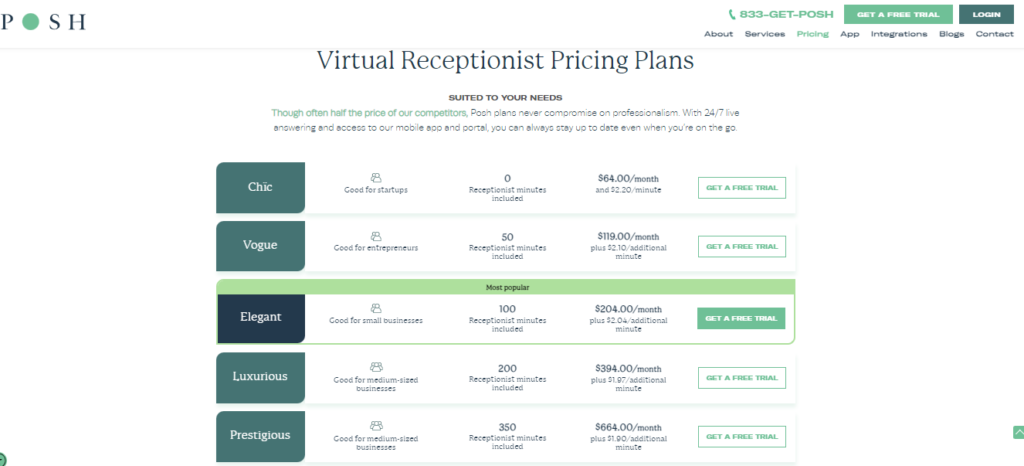
Posh adopts a tiered pricing structure based on the number of contacts and the features required by the user. This approach allows businesses to choose a plan that aligns with their needs and budgetary constraints. Here’s a breakdown of Posh’s pricing model:
1. Base Price: Posh’s plans start at £64.00 per month. This base price includes access to the basic features offered by the platform, such as live call answering, message management, and appointment scheduling.
2. Additional Charges: In addition to the base price, Posh charges an additional fee of £1.20 per minute for each additional minute used beyond the allotted monthly allowance. This ensures that businesses only pay for their services, providing flexibility and cost-effectiveness.
3. Tiered Structure: As businesses scale and their needs evolve, Posh offers higher-tier plans with access to advanced features and expanded usage limits. These plans are priced accordingly, allowing businesses to upgrade their subscription as needed to accommodate growth and increased demand.
4. Customization Options: Posh also provides customization options for businesses with unique requirements or specific preferences. This may include tailored packages, additional features, or personalized support, all of which can be negotiated with Posh’s sales team to ensure a bespoke solution that meets the business’s needs.
5. Transparency: Posh’s pricing structure is transparent, ensuring that businesses understand the prices of their chosen package and any additional charges that may apply. This transparency helps businesses budget effectively and avoid unexpected expenses, fostering trust and confidence in the platform.
Conclusion:
Both Ruby and Posh offer robust features and capabilities to meet the diverse needs of modern businesses. While Ruby excels in user-friendliness and affordability, Posh stands out for its advanced automation capabilities and personalized approach.
1. Ruby: Ruby offers a user-friendly interface and clear pricing, making it a budget-friendly choice for businesses needing virtual receptionist services. Its focus on simplicity and affordability appeals to small and medium-sized businesses aiming to improve efficiency without overspending.
2. Posh: On the other hand, Posh offers advanced automation capabilities and customizable workflows, making it ideal for businesses looking to optimize their customer interactions and scale their operations. Their personalized approach and AI-powered chatbots enable businesses to deliver tailored customer experiences that drive engagement and satisfaction.
Ultimately, the choice between Ruby and Posh will depend on your specific requirements, budget, and business objectives.
If you prioritize affordability and ease of use, Ruby may be the better option for you. However, if you require advanced automation capabilities and personalized customer interactions, Posh may be the ideal choice.
By carefully evaluating your business needs and comparing the features and capabilities of each provider, you can make an informed decision that aligns with your goals and enhances your customer experience.









